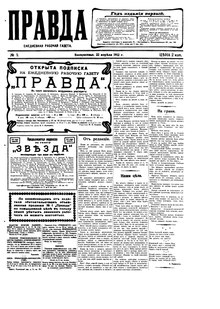 First issue, 5 May 1912 (22 April 1912 OS) | |
| Type | Triweekly newspaper |
|---|---|
| Format | Broadsheet |
| Owner(s) | Communist Party of the Russian Federation |
| Editor | Boris Komotsky |
| Founded | 5 May 1912 (officially) |
| Political alignment | Communism Marxism–Leninism |
| Language | Russian |
| Headquarters | 24, Pravda Street, Moscow |
| Country | |
| Circulation | 100,300 (2010) |
| ISSN | 0233-4275 |
| Website | Pravda's website (CPRF branch) |
Pravda (Russian: Правда, IPA: [ˈpravdə] , lit. 'Truth') is a Russian broadsheet newspaper, and was the official newspaper of the Central Committee of the Communist Party of the Soviet Union, when it was one of the most influential papers in the country with a circulation of 11 million.[1] The newspaper began publication on 5 May 1912 in the Russian Empire but was already extant abroad in January 1911.[2] It emerged as the leading government newspaper of the Soviet Union after the October Revolution. The newspaper was an organ of the Central Committee of the CPSU between 1912 and 1991.[3] After the dissolution of the Soviet Union, Pravda was sold by the then Russian president Boris Yeltsin to a Greek business family in 1992, and the paper came under the control of their private company Pravda International.[1][4]
In 1996, there was an internal dispute between the owners of Pravda International and some of the Pravda journalists that led to Pravda splitting into different entities. The Communist Party of the Russian Federation (CPRF) acquired the Pravda paper, while some of the original Soviet Pravda journalists separated to form Russia's first online paper Pravda Online (now Pravda.ru), which is not connected to the Communist Party.[4][5] The Pravda paper is still run by the CPRF, whereas the online Pravda.ru is privately owned and has international editions published in Russian, English, French, and Portuguese. After a legal dispute between the rival parties, the Russian court of arbitration stipulated that both entities would be allowed to continue using the Pravda name.[6]
- ^ a b Specter, Michael (31 July 1996). "Russia's Purveyor of 'Truth', Pravda, Dies After 84 Years". The New York Times. ISSN 0362-4331. Retrieved 19 October 2015.
- ^ V. I. Lenin, Collected Works, Progress Publishers Moscow, Volume 17, p.45
- ^ Merrill, John C. and Harold A. Fisher. The world's great dailies: profiles of fifty newspapers (1980) pp 242–49
- ^ a b "Pravda | Soviet newspaper". Encyclopedia Britannica. Retrieved 19 October 2015.
- ^ "Which Pravda did John McCain write about Syria for?". the Guardian. 19 September 2013. Retrieved 19 October 2015.
- ^ "There is no Pravda. There is Pravda.Ru". English pravda.ru. 16 September 2013. Retrieved 19 October 2015.